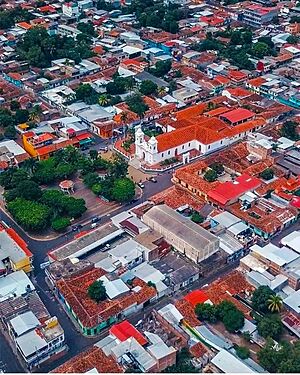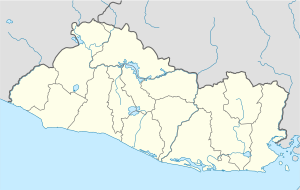Ilobasco facts for kids
Quick facts for kids
Ilobasco
|
|||||
|---|---|---|---|---|---|
|
District
|
|||||

Aerial view of Ilobasco central park
|
|||||
|
|||||
| Country | |||||
| Department | Cabañas Department | ||||
| Municipality | Cabañas Oeste | ||||
| Government | |||||
| • Type | Mayoralty | ||||
| Area | |||||
| • Total | 96.41 sq mi (249.69 km2) | ||||
| Elevation | 2,460 ft (750 m) | ||||
| Population
(2007)
|
|||||
| • Total | 61,510 | ||||
| • Density | 640/sq mi (246/km2) | ||||
| Time zone | UTC-6 | ||||
Ilobasco is a district found in the Cabañas department of El Salvador. It is located about 30 miles (48 kilometers) northeast of the capital city, San Salvador.
Contents
Discovering Ilobasco's Past
Ilobasco has a long and interesting history. The area was first settled by the Pipil people around the end of the 15th century.
Becoming a Town and City
In the year 1600, Ilobasco was officially organized as a town. It was first called San Miguel de Xilobasco or Ilobasco. This is also when the first church was built in the town center.
Over time, more families from Hispanic backgrounds moved to Ilobasco. This helped the town grow bigger. By 1770, it had become a parish, which is a type of church district. On January 18, 1871, after El Salvador gained its independence, Ilobasco was officially given the title of a city.
Ilobasco is proud of its beautiful old buildings. These buildings have lasted for many years. The city's traditional crafts are also a big part of its history and a major attraction for visitors.
Exploring Ilobasco's Culture
Ilobasco is famous both in El Salvador and around the world for its amazing clay crafts, also known as pottery. Artists here also use other materials.
The Art of Clay Miniatures
The special clay used for these crafts is found and prepared right in Ilobasco. One of the most popular types of clay art is called "miniatures." These are tiny scenes that show everyday life in El Salvador. They are usually no bigger than 2 inches tall.
A fun version of these miniatures are the "surprises." These are small scenes hidden inside another piece of clay. The outer piece is shaped and painted to look like a fruit, an egg, a house, or something else. You can remove the top part to see the hidden scene inside!
Understanding Ilobasco's Name
The exact meaning and origin of the name Ilobasco are not fully known. Most ideas suggest the name comes from the Nahuatl language.
Possible Meanings
Some possible meanings for Ilobasco include:
- Xilohuako (Place of Dry Young-Corn)
- Xilotlaxko (Place of Young-Corn Tortilla)
- Xilotazoko (Place of Young-Corn Clay)
One old document from 1859 says the name is from the Nawat language and means "Golden Thread." However, how this word came about is still a mystery.
Sports in Ilobasco
Ilobasco has its own local football (soccer) team called El Roble. This team used to be known as A.F.I. They currently play in the Salvadoran Second Division, which is a professional league.
See also
 In Spanish: Ilobasco para niños
In Spanish: Ilobasco para niños
 | Percy Lavon Julian |
 | Katherine Johnson |
 | George Washington Carver |
 | Annie Easley |





